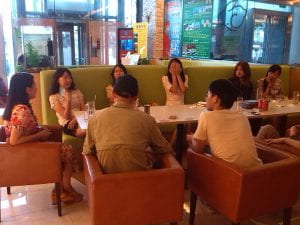- Several people sit around a table.
- They can have chitchat on any topics or play any board role-play games.
- However during the whole process, people cannot say the “Dead words” of “like”, “so”, “well”, “yes” or “no”. This rule is flexible which can be set up particularly for the game you are playing. For example, people cannot say “kill”, “wolf”, or “dead” in a Werewolves game.
- Whenever a player says one of those words, other players should shout out immediately and pause the game/conversation, and that person has to be punished(sing a song/dance/do push-up) or be dead in the Werewolves game.
- If a player shout out mistakenly, that player will be punished.
In the playtest, 12 of us played the Werewolves game as the basis. After several rounds when people were perfectly familiar with the rules, we decided to apply this Dead-Word game to the original game.

The new rule was that, if one said the dead-words of “kill”, “dead” or “wolf”, his/her on-going speech would be interrupted immediately and he/she could not vote in that round. The process was really funny. People spoke incredibly slowly in a twisted way in order to avoid the punishments. All of the players were Chinese however I asked them to speak English during the whole game, and they actually did at the beginning. But when several punishments had occurred, they became more and more nervous and some of them started to speak “Chinglish”. Meanwhile the result of the game was dramatically changed because many villagers lost their voting rights during the “daytime” thus they lost the game even when they had a huge superiority.
I chose this game as my intervention work because the Werewolves is a game about talking. When the general ways of talking are forbidden, the whole game will be influenced include both the processes and the results. The interventions will make people uncomfortable and it will be quite funny to listen to people talking slowly in a strange way while using weird vocabs.
The inspiration was drawn from the art pieces by several performance artists including “Lord Napier in Red Tape” by Eleonora Aguiari and the “Fountain” by Marcel Duchamp. Those art pieces inspired me indirectly by letting me think about what would happen when a object you are familiar with suddenly changed. That is, habits are actually more powerful then people think. If you pay attention to what happens around you, you’ll figure out that many things actually happen in the exactly same order from day to day. For example every morning I get up, brush teeth, wash face and go out. It looks normal however if one day someone tells me that I must wash face before brushing teeth, I’ll actually feel very uncomfortable. Thus I designed this Dead-word game in order to change people’s habit of talking and to see what will happen after then. Those interventions can sometimes make some people uncomfortable, but when people get the idea they may have a new thought on their daily life. No matter it is visual art, language art or performance art, creating interventions is always a good way to let people think about the existed world and how we can change it.
